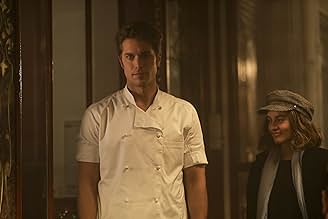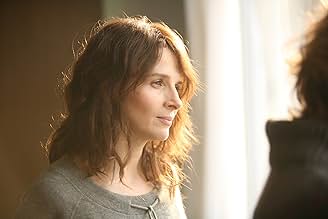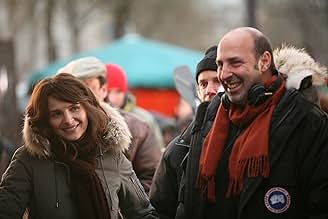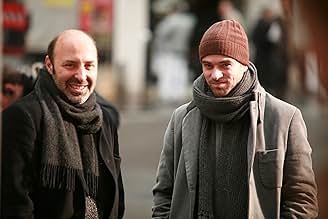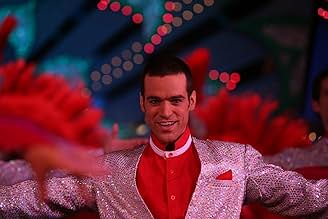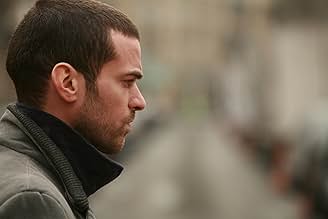IMDb रेटिंग
6.8/10
13 हज़ार
आपकी रेटिंग
अपनी भाषा में प्लॉट जोड़ेंA ex-dancer has a heart problem and even with a transplant, he may still only have a few months to live. Time's spent looking at people/life in Paris from his balcony. His single mom sister ... सभी पढ़ेंA ex-dancer has a heart problem and even with a transplant, he may still only have a few months to live. Time's spent looking at people/life in Paris from his balcony. His single mom sister moves in with her 3 kids to look after him.A ex-dancer has a heart problem and even with a transplant, he may still only have a few months to live. Time's spent looking at people/life in Paris from his balcony. His single mom sister moves in with her 3 kids to look after him.
- पुरस्कार
- 4 कुल नामांकन
फ़ीचर्ड समीक्षाएं
The movie is mostly made of vignettes following several characters, loosely interconnected in the city of Paris. Sounds familiar. To be honest, I've grown tired of the many dramas borrowing that formula. It's become an epidemic, especially since Magnolia. And so, I did not expect to enjoy Paris all that much. But I loved it and it moved me by its stripped down, sincere approach.
Director and writer Cédric Klapisch, unlike several of his contemporaries, did not feel the need to employ convoluted means to link these characters, or end the movie on some sort of unifying, highly artificial bang. Klapish wisely elects to concentrate on building strong characters. He succeeds, so much so that it becomes easy for him to create simple, believable story lines for them. The real link between them? They are fallible, restless, tentative, longing... in other words, they are human.
There's a large cast here and Klepish mostly concentrates on a few of them. Many of the smaller parts are actually as intriguing as the bigger roles and I caught myself wondering what would happen to those characters. But Klapisch stays the course and ends the movie much like it began. A lot is left unresolved, much like life. No Hollywood ending here but I could certainly have followed those characters for another hour if need be.
A beautiful, stripped down story but enough subtext and genuine quality to make for a great and lasting movie experience.
Director and writer Cédric Klapisch, unlike several of his contemporaries, did not feel the need to employ convoluted means to link these characters, or end the movie on some sort of unifying, highly artificial bang. Klapish wisely elects to concentrate on building strong characters. He succeeds, so much so that it becomes easy for him to create simple, believable story lines for them. The real link between them? They are fallible, restless, tentative, longing... in other words, they are human.
There's a large cast here and Klepish mostly concentrates on a few of them. Many of the smaller parts are actually as intriguing as the bigger roles and I caught myself wondering what would happen to those characters. But Klapisch stays the course and ends the movie much like it began. A lot is left unresolved, much like life. No Hollywood ending here but I could certainly have followed those characters for another hour if need be.
A beautiful, stripped down story but enough subtext and genuine quality to make for a great and lasting movie experience.
Being a Parisian myself, and a great fan of all other Klapisch movies, I expected a lot about this one. Well, I was pretty satisfied: although it is no masterpiece, the global atmosphere, and especially the gorgeous views of the city are very well put together. The actors are very convincing too, especially Juliette Binoche, radiant, Luchini, a surprisingly good dancer, and Albert Dupontel. It is just a pity that there are so many simultaneous stories, some of them don't really bring much to the plot and could have been cut, to leave more time to the others.
Anyway, I recommend this movie for all people who want to get a feel for what Paris is all about!
Anyway, I recommend this movie for all people who want to get a feel for what Paris is all about!
I was really looking forward to see this film for different reasons: The trailer made it look really heart filling, Juliet Binoche and basically because I love French cinema. So I finally got to do so, but man was I disappointed.
It wasn't utterly bad, but basically, for me, it just didn't grab me at any point. Everything and everyone (Each character) seemed so dry, so inexpressive, things would happen and they'd all be like "OH... o.k" and at moments they even seemed to contradict them self's. I don't know, I've seen lots of movies where each characters story is intertwined and some are good, some suck.
I've seen it in American, Italian, French, German and even Spanish cinema, so that kind of story telling is not unique in it self anymore and because of that, it's harder to do it, and I think that in this case, seeing how non of the stories needed the other to exist, none of them really coexisted as one and there fore there was no reason to tell them all in the same piece, well it simply wasn't the best of movies, again it doesn't utterly suck, it just isn't as good as it could have been.
It wasn't utterly bad, but basically, for me, it just didn't grab me at any point. Everything and everyone (Each character) seemed so dry, so inexpressive, things would happen and they'd all be like "OH... o.k" and at moments they even seemed to contradict them self's. I don't know, I've seen lots of movies where each characters story is intertwined and some are good, some suck.
I've seen it in American, Italian, French, German and even Spanish cinema, so that kind of story telling is not unique in it self anymore and because of that, it's harder to do it, and I think that in this case, seeing how non of the stories needed the other to exist, none of them really coexisted as one and there fore there was no reason to tell them all in the same piece, well it simply wasn't the best of movies, again it doesn't utterly suck, it just isn't as good as it could have been.
Paris is a kaleidoscopic view of that great City of Light inhabited with a variety of individuals each of whom is consumed with life and love and living and dying. Cédric Klapisch has written and directed this richly populated canvas as a background of a tender story of a Moulin Rouge male dancer Pierre (Romain Duris) who is diagnosed with a terminal heart disease requiring transplantation if he is to survive. But in the end the many characters introduced in 'incidental stories' have become so interesting that, instead of providing simply a background for Pierre's portrait, they become an integral part of the drama as well as indelibly stamped on the viewer's mind.
Pierre has kept his illness secret, yet when faced with the dire concept of a transplant he confides in his sister Élise (Juliette Binoche), a single mother of three, who takes him in to fill his boring days of self confinement. There is a palpable magic between the two as Élise attempts to bring Pierre out into the world of hope and of living. Incidental to her life are trips to the market where she observes the lives of the grocers and discovers their private lifestyles, information shared freely with the viewer. A Parisian North African communicates with his brother at home with a postcard of Paris, seducing the brother to brave all odds to come to the city. We also meet a jaded art historian Roland Verneuil (Fabrice Luchini) whose father has just died, an event that devastates his emotional brother Philippe (François Cluzet): Roland proceeds to have an affair with a student but his physical awakening is abruptly altered by the realities of Parisian life while Philippe progresses through his seemingly mundane existence toward a surprise ending. The grocers seek adventures with a group of girls among whom is the ex-wife of one of the men and in the process we observe the varying reactions of interpersonal relationships tested away from the eyes of group participation. All of these stories are white noise to Pierre's situation, and though Élise is able to make Pierre 'dance again' at a party of his fellow dancers she organizes, in the end Pierre is left to care for Élise's children while Élise finally opens her frozen heart to a new romance. At this point Pierre receives the inevitable telephone call that a transplant is ready, and as he proceeds to the hospital he opens his mind to the beauties of Paris. Some of the vignettes we have observed are completed while most simply continue - just like life in the glorious city so often considered the city of love.
All of the many roles are enacted by gifted actors, the cinematography offers us a different view of Paris than that of postcards and travel brochures, and the musical score ranges from popular music to the haunting 'Gnossiemme No. 1' of Erik Satie which is Pierre's theme music. At times the viewer feels lost in the complex overlay of the many stories being told, but settling back in a chair and just absorbing the film results in an evening of Parisian intoxication.
Grady Harp
Pierre has kept his illness secret, yet when faced with the dire concept of a transplant he confides in his sister Élise (Juliette Binoche), a single mother of three, who takes him in to fill his boring days of self confinement. There is a palpable magic between the two as Élise attempts to bring Pierre out into the world of hope and of living. Incidental to her life are trips to the market where she observes the lives of the grocers and discovers their private lifestyles, information shared freely with the viewer. A Parisian North African communicates with his brother at home with a postcard of Paris, seducing the brother to brave all odds to come to the city. We also meet a jaded art historian Roland Verneuil (Fabrice Luchini) whose father has just died, an event that devastates his emotional brother Philippe (François Cluzet): Roland proceeds to have an affair with a student but his physical awakening is abruptly altered by the realities of Parisian life while Philippe progresses through his seemingly mundane existence toward a surprise ending. The grocers seek adventures with a group of girls among whom is the ex-wife of one of the men and in the process we observe the varying reactions of interpersonal relationships tested away from the eyes of group participation. All of these stories are white noise to Pierre's situation, and though Élise is able to make Pierre 'dance again' at a party of his fellow dancers she organizes, in the end Pierre is left to care for Élise's children while Élise finally opens her frozen heart to a new romance. At this point Pierre receives the inevitable telephone call that a transplant is ready, and as he proceeds to the hospital he opens his mind to the beauties of Paris. Some of the vignettes we have observed are completed while most simply continue - just like life in the glorious city so often considered the city of love.
All of the many roles are enacted by gifted actors, the cinematography offers us a different view of Paris than that of postcards and travel brochures, and the musical score ranges from popular music to the haunting 'Gnossiemme No. 1' of Erik Satie which is Pierre's theme music. At times the viewer feels lost in the complex overlay of the many stories being told, but settling back in a chair and just absorbing the film results in an evening of Parisian intoxication.
Grady Harp
To day I went to see "Paris" and hoped to win a trip to Paris from Sydney out of it! I had seen L'auberge espagnole and had no idea of the link! To top this, by accident I caught a french movie on TV to night perhaps already running for 10 minutes and it was Russian Dolls! Again I did not realise it was related, even called a Sequel to l'auberge espagnole! I enjoyed the 3 movies each on their own way. "Paris", my birth city, I did enjoy immensely, yet I could have imagine its story in any other city. Although it was nice to catch up with sites I have not seen for 25 years and left nearly 40 years ago, but to me it was very much this cocktail of people and their personal situation that moved me so much. Just like everyday life with its humor, sadness and pain all this with a comfortable music that actually did ease a little the pain. Again I thank those who write so well here and gave a concise and very interesting account of this wonderful film. I think one of these writings should appear with the main page of the film rather than tentative account like mine. Bu if by chance you are reading mine I'd like to let you know that if you go to see this movie, just go with the flow and you should not be disappointed.
क्या आपको पता है
- ट्रिवियाAs end credits conclude, the choreographed dance show with Pierre shown earlier has a brief repeat.
- गूफ़When the shop-owner of the bakery sell a baguette she asks for 80 cent, doesn't register it in the till, which has the figures 0,00 than it changes to 0,78 than back to 0,00 again.
- साउंडट्रैकMunivers de Paris
Written by Robert Burke (as R. Burke) and Loïc Dury (as L. Dury)
Performed by Kraked Unit
Universal Music Publishing
MGB / Kraked - ce qui me meut production
टॉप पसंद
रेटिंग देने के लिए साइन-इन करें और वैयक्तिकृत सुझावों के लिए वॉचलिस्ट करें
- How long is Paris?Alexa द्वारा संचालित
विवरण
- रिलीज़ की तारीख़
- कंट्री ऑफ़ ओरिजिन
- आधिकारिक साइट
- भाषा
- इस रूप में भी जाना जाता है
- Париж
- फ़िल्माने की जगहें
- उत्पादन कंपनियां
- IMDbPro पर और कंपनी क्रेडिट देखें
बॉक्स ऑफ़िस
- बजट
- $1,20,00,000(अनुमानित)
- US और कनाडा में सकल
- $10,10,194
- US और कनाडा में पहले सप्ताह में कुल कमाई
- $46,518
- 20 सित॰ 2009
- दुनिया भर में सकल
- $2,33,28,518
- चलने की अवधि2 घंटे 10 मिनट
- रंग
- ध्वनि मिश्रण
- पक्ष अनुपात
- 2.35 : 1
इस पेज में योगदान दें
किसी बदलाव का सुझाव दें या अनुपलब्ध कॉन्टेंट जोड़ें



